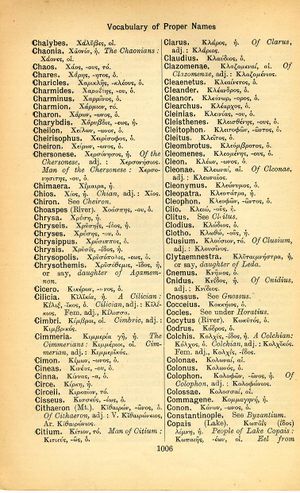Colophon
Κύριε, σῶσον τὸν δοῦλον σου κτλ. → Lord, save your slave ... (mosaic inscription from 4th cent. church in the Negev)
English > Greek (Woodhouse)
Κολοφῶν, -ῶνος, ἡ.
Of Colophon, adj.: Κολοφώνιος.
Latin > English (Lewis & Short)
Cŏlŏphon: ōnis (acc. -nem, Cic. Imp. Pomp. 12, 33;
I -na, Vell. 1, 4, 3; Tac. A. 2, 54), m., = Κολοφών, one of the twelve Ionian towns in Lydia, situated near the sea, and renowned for its cavalry, now perh. Zille or Altobosco, Mel. 1, 17, 2; Cic. Imp. Pomp. 12, 33; Liv. 37, 26, 5 sq.; Hor. Ep. 1, 11, 3. —
II Hence,
A Cŏlŏphōnĭus, a, um, adj., Colophonian: resina, Plin. 14, 20, 25, § 123 (also absol.: Colophonia, Scrib. Comp. 137 sq.): Idmon, Ov. M. 6, 8.—In plur.: Cŏlŏphōnii, ōrum, m., the Colophonians, Cic. Arch. 8, 19.—
B Cŏlŏphōnĭăcus, a, um, adj., the same: Homerus (since the inhabitants of Colophon considered him as their countryman; v. Cic. Arch. l. l.), Verg. Cir. 64; Cels. 5, 19, 11; 5, 19, 17.
Latin > French (Gaffiot 2016)
(2) Cŏlŏphōn,¹⁴ ōnis, f., Colophon [ville d’Ionie] : Cic. Pomp. 33

